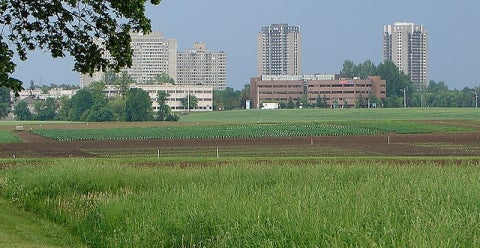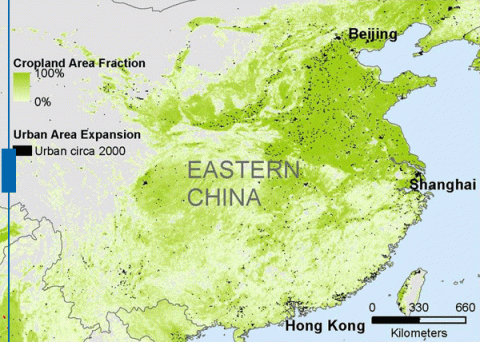Note: Yale School of the Environment (YSE) was formerly known as the Yale School of Forestry & Environmental Studies (F&ES). News articles and events posted prior to July 1, 2020 refer to the School's name at that time.

The growth of mega-cities will eliminate massive areas of valuable cropland in some parts of the world by the year 2030, according to a new international study co-authored by Yale Prof. Karen Seto.
According to the study, published in the Proceedings of the National Academy of Sciences, some 300,000 square kilometers of fertile cropland worldwide — an area roughly the size of New Jersey — will be lost.
According to the study, published in the Proceedings of the National Academy of Sciences, some 300,000 square kilometers of fertile cropland worldwide — an area roughly the size of New Jersey — will be lost.
In Meeting Future Energy Demands, Density is as Important as Efficiency
 <small>Population density will be a critical factor in determining how much energy is needed to cool and heat buildings in the world’s urban areas by mid-century, according to a new study co-authored by Karen Seto, Professor of Geography and Urbanization Science. <a href="http://environment.yale.edu/news/article/when-meeting-energy-demands-of-growing-cities-density-will-be-as-critical-as-efficiency-study-finds/">Read more</a></small>
<small>Population density will be a critical factor in determining how much energy is needed to cool and heat buildings in the world’s urban areas by mid-century, according to a new study co-authored by Karen Seto, Professor of Geography and Urbanization Science. <a href="http://environment.yale.edu/news/article/when-meeting-energy-demands-of-growing-cities-density-will-be-as-critical-as-efficiency-study-finds/">Read more</a></small>
While that accounts for only about 2 percent loss of today’s global cropland, the losses will be acute in some countries and regions, particularly in Africa and Asia, said Seto, Professor of Geography and Urbanization Science at the Yale School of Forestry & Environmental Studies (F&ES).
Egypt, for example, is predicted to lose more than one-third of its total cropland, while Vietnam and Nigeria are expected to lose 16 percent and 12 percent of their cropland, respectively.
“For these countries, it will be critical to develop strategies for urban development that do not result in massive loss of productive farmlands and ultimately livelihoods for millions of farmers,” Seto said.
According to the study, cropland losses will occur on land that is nearly twice as fertile as the world average. That area also produced about 4 percent of global food crops in 2000, the researchers estimate.
Crops most likely to be affected include rice, maize, soy beans and wheat — all of them key food sources for billions of people.
Egypt, for example, is predicted to lose more than one-third of its total cropland, while Vietnam and Nigeria are expected to lose 16 percent and 12 percent of their cropland, respectively.
“For these countries, it will be critical to develop strategies for urban development that do not result in massive loss of productive farmlands and ultimately livelihoods for millions of farmers,” Seto said.
According to the study, cropland losses will occur on land that is nearly twice as fertile as the world average. That area also produced about 4 percent of global food crops in 2000, the researchers estimate.
Crops most likely to be affected include rice, maize, soy beans and wheat — all of them key food sources for billions of people.
 Move the slide control left and right to change between the years 2000 and 2030. (Source: MCC)
Move the slide control left and right to change between the years 2000 and 2030. (Source: MCC)
The study was led by researchers at the Mercator Research Institute on Global Common and Climate Change (MCC) in Germany.
For the study, the scientists combined spatially explicit urban area expansion projections from Yale with land-use data from the University of Minnesota and the University of British Columbia on global croplands and crop yields. To determine the productivity of that land, the researchers used the aggregated production of the 16 most important food crops, including maize, rice, soybean, and wheat.
“Hotspots of cropland loss tend to be river valleys and deltas, such as the Yangtze River Delta near Shanghai or the Pearl River Delta near Hong Kong,” said Bren d’Amour, a Ph.D. candidate at MCC, a Visiting Assistant in Research at F&ES, and lead author of the paper. “On a regional level, that food production loss cannot always be compensated for. This, in turn, could have an impact on the world food system.”
For the study, the scientists combined spatially explicit urban area expansion projections from Yale with land-use data from the University of Minnesota and the University of British Columbia on global croplands and crop yields. To determine the productivity of that land, the researchers used the aggregated production of the 16 most important food crops, including maize, rice, soybean, and wheat.
“Hotspots of cropland loss tend to be river valleys and deltas, such as the Yangtze River Delta near Shanghai or the Pearl River Delta near Hong Kong,” said Bren d’Amour, a Ph.D. candidate at MCC, a Visiting Assistant in Research at F&ES, and lead author of the paper. “On a regional level, that food production loss cannot always be compensated for. This, in turn, could have an impact on the world food system.”
– Kevin Dennehy kevin.dennehy@yale.edu 203 436-4842
Published
January 3, 2017